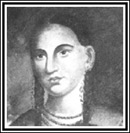The Chicago Portage archive is available for download as a single .zip file from here. The archive includes copies of The Chicago Portage Ledger, photographs of the site, and the video "Connected Worlds: The Story of the Chicago Portage.
Furthermore, this December, we are launching a new platform for our unique digital collections.
Please take a moment to preview it and let us know what you think!
Frontier Love
Late in 1825 Hubbard was invited to Tamin’s village not far from his post which was then on the Iroquois River. It was the corn harvest feast which culminated with the Crane Dance when the eligible women could choose their partner in the dance. Tamin’s niece, now nearly fifteen, approached Hubbard and asked if he remembered her. He replied with her Indian name saying: “I remember you Watch-e-kee”.
Hubbard kept his promise to Chief Tamin. They were married and lived at his post on the Iroquois River. The town that grew up around their post was called Middleport. After the two year long marriage ended, she left followed her tribe across the Mississippi to reservations in Iowa when the tribes were removed from Illinois by the Treaty of Chicago. Later in her life she returned to visit the town which, in her honor, had changed its name to Watseka.
Hubbard never wrote publically about this early union, but years later Hubbard wrote to a friend about his first wife.
“I have no wish to deny the fact of her being my wife, given me by her uncle (the chief) when she was about ten, in the place of his own grown daughter whom he presented to me, and whom I declined. This little girl was to take her place, and was, under my pledge to make her my wife, brought to me by her mother at the age of fourteen or fifteen. She bore me a daughter who died at about eight month old. I lived with this Indian woman about two years in harmony. Our separation was by mutual agreement, in perfect friendship, and because I was about to abandon the Indian trade, and of course, my connection with the Indian tribe. Both thought each other’s happiness would be promoted by separation, as it doughtless was.”
Next page: John Jacob Hubbard




